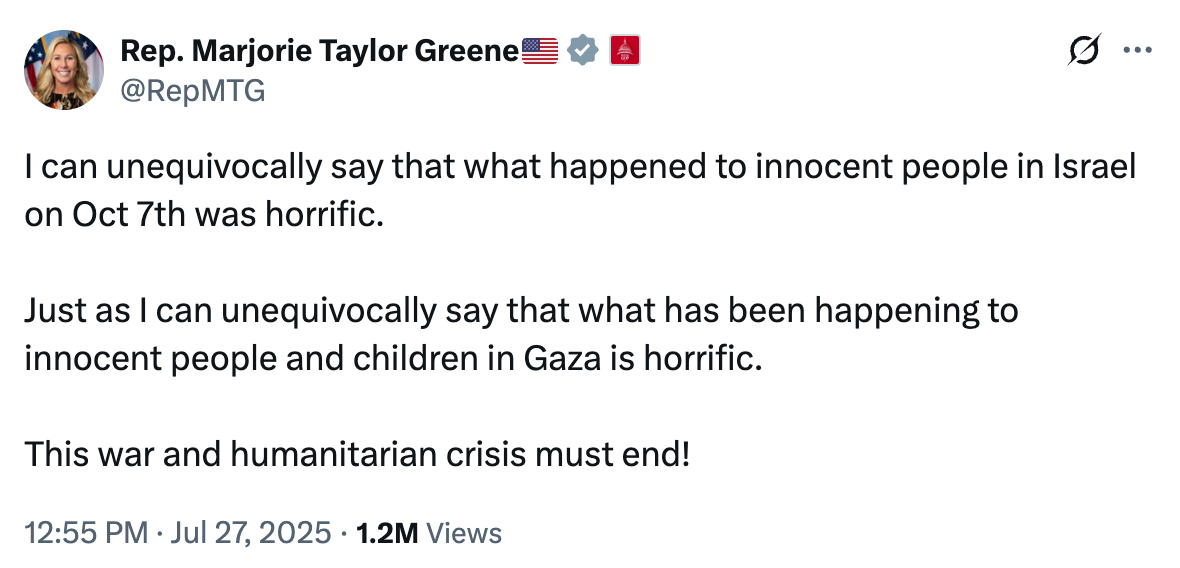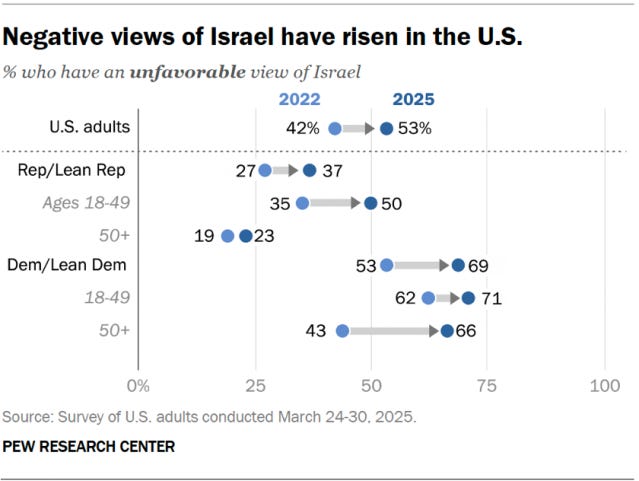A Tweet That Should Scare Israel
Amid reports of starvation, Israel is hemorrhaging allies across the American political spectrum.
I.
People often ask me what I think the Republican Party will be like after Donald Trump steps off the political stage.
I sometimes get the sense that they want me to say that the party will have an “epiphany,” as Joe Biden put it, and return to the Bush/McCain/Romney era, resuming its support for more traditional conservative principles as if the years 2017-2029 never happened. 2028 nominee Nikki Haley, perhaps?
This is, of course, one possibility, although I view it as a very, very remote one.
A much larger possibility, often overlooked, is that Donald Trump will be the least populist president Republicans put forward for a while.
That may sound strange, considering Trump is often credited for bringing about the GOP’s populist transition. But, ultimately, he is just that: a transitional figure, and an awkward one. Trump infused populism into the party, but was a poor fit for it. Ultimately, he doesn’t care that much about policy; his fealty to populist principles just wasn’t strong enough to radially shift the party platform.
As Semafor’s Ben Smith recently noted, the Tucker Carlson/Steve Bannon wing hasn’t been too thrilled with the tax-cutting-tariff-dithering-Iran-bombing Trump second term.
The good news for this wing of the party is that Trump’s successor as the Republican standard-bearer will likely be JD Vance,1 who, in some ways, fits much more comfortably in the MAGA mold than even the movement’s founder.
Trump, with advice from Bannon and others, stumbled onto populism later in life as a convenient vehicle for political success. (Some issues, like tariffs, he already believed in.) But the next generation of Republicans who came up in Trump’s shadow — the Vances and Josh Hawleys of the world — started their careers soaked in Trumpism, which means they are more likely to govern as populists in all the ways Trump campaigned (but never acted) as one.
To take one issue, in his prospective 2028 campaign, Vance will probably never say a negative word about the Big Beautiful Bill, for which he cast the tie-breaking vote and traveled to Ohio yesterday to promote.
But, if we were to be put the vice president on truth serum, my guess is we’d discover that Vance’s version of the package would have looked a lot different than Trump’s. Vance, remember, proposed a $5,000 Child Tax Credit during the 2024 campaign. (The final bill increased the maximum CTC from $2,000 to $2,200.) Vance was reportedly also pushing for the legislation to raise taxes on the wealthy, a piece of conservative orthodoxy that even Trump has yet to touch.
If you think the Republican Party has changed, you ain’t seen nothing yet. Trump brought populism to the party, but the next stage could be a much harder-core adoption of it.
II.
This isn’t just true of economic policy, but of foreign policy, as well.
Some of the fiercest fights inside the second Trump administration have been over interventionism, with figures like Pentagon policy chief Elbridge Colby controversially championing a full “America First” foreign policy while others like Marco Rubio steer Trump towards remaining involved in Israel, Ukraine, and other conflicts. (As Smith put it: Colby and his allies “advocated pulling away from Ukraine and the Middle East in favor of buttressing defenses against China. Trump appointed an old friend, Steve Witkoff, to supersede them, ignored their concerns, and exploded the jewels of American rocketry in the Donbas and Fordow.”)
A Vance administration would likely have looked at these conflicts differently, as evidenced by the fact that Vance came to Colby’s defense during his confirmation process. (“Bridge has consistently been correct about the big foreign policy debates of the last 20 years,” Vance tweeted, using the nominee’s nickname.) Colby had come under fire from pro-Israel Republican senators for arguing that the U.S. should pull back from the Middle East.
One tell for the future of Republican foreign policy came Sunday, in an X post from — of all people — Marjorie Taylor Greene, the Republican firebrand from Georgia. Greene wrote:
Then, on Monday, she followed it up by applauding a message from a fellow Republican lawmaker, Texas Rep. Lance Gooden, who had condemned “the killing and starvation of children in Gaza” earlier that day. “Glad to see this. More need to speak out!” Greene said.
By Monday night, Greene was picking an intraparty fight over the issue, criticizing Florida Rep. Randy Fine, who tweeted last week, “Release the hostages. Until then, starve away.”
“It’s the most truthful and easiest thing to say that Oct 7th in Israel was horrific and all hostages must be returned,” Greene wrote, “but so is the genocide, humanitarian crisis, and starvation happening in Gaza.” It was the first time, as far as I could tell, that a Republican member of Congress had described Israel’s treatment of Gaza as a “genocide.”
In these missives, Greene, of course, was responding to the recent reports of starvation in Gaza. The World Food Program has warned that “some 470,000 people are enduring famine-like conditions” in the territory. The Gaza Health Ministry, which is run by Hamas, has reported more than 40 hunger-related deaths this month, including 16 children.
Israel imposed a blockade on food going into Gaza from March until May. After lifting the total siege, Israel took steps to replace the UN-led aid system that had existed for most of the war with a food distribution process that took place only in areas controlled by the Israeli military. According to the UN, more than 1,000 Palestinians have been killed by Israeli forces since May while trying to get food at these sites. Israel is now instituting limited pauses in fighting in parts of Gaza for 10 hours a day to allow for more humanitarian aid to enter.
Maybe the fact that Marjorie Taylor Greene was so forcefully responding to these conditions is of little consequence. Greene, after all, is often a sideshow; her tweets about Gaza are interspersed with missives about “weather modification.” But she also often has her finger on the pulse of the Republican base; whether she is criticizing the AI state regulation ban in the Big Beautiful Bill or calling for the release of the Epstein Files, it’s not unusual for issues to go from her X feed to the Republican Party mainstream in a matter of days.
In this case, Greene’s Sunday tweet did accurately presage how Trump and Vance both responded to the hunger in Gaza. Asked Monday if he agreed with Israeli Prime Minister Benjamin Netanyahu, who said that “there is no starvation in Gaza,” Trump replied: “Based on television, I would say not particularly, because those children look very hungry. They have to get food and safety right now.” Trump vowed to set up new food centers in the territory.
Vance, tellingly, went even farther. “I don’t know if you’ve all seen these images. You have got some really, really heartbreaking cases. You’ve got little kids who are clearly starving to death,” Vance told reporters on Monday.
“Israel’s got to do more to let that aid in,” he added. “And we’ve also got to wage war on Hamas so that those folks stop preventing food from coming into this territory.”
III.
The Israeli blockade on food coming into Gaza came after Netanyahu broke a ceasefire (negotiated after Trump’s election) to continue fighting. As the New York Times noted, that move “has come at great cost, first and foremost to Palestinian civilians, but also to Israel’s standing in the world.”
In the months since Israel has resumed the war, European leaders have grown more vocal in their criticism of the country. The president of France even announced plans to recognize a Palestinian state.
Here in the U.S., Israel is hemorrhaging support as well. 40 Senate Democrats, including Minority Leader Chuck Schumer (D-NY), penned a letter this morning condemning the “dire” humanitarian situation in Gaza. When you’ve lost Marjorie Taylor Greene and Chuck Schumer, you don’t have many remaining backers in American politics.
American views of Israel have declined in polling — mostly driven by Democrats and Independents, but with a noticeable drop among Republicans as well. A new CNN poll found that only 23% of Americans say Israel’s actions in Gaza have been “fully justified.” According to the network, since 2023, the share of Democrats who believed Israel’s actions have been fully justified has dropped from 38% to 7%. The share among Independents has dropped from 45% to 14%. The share among Republicans dropped from 68% to 52%.
A Pew Research poll from April similarly found that negative views of Israel have increased ten points among Republicans since 2022, reaching 37%.
Most importantly when looking towards the future, that increase only wasn’t larger because Republicans over the age of 50 hadn’t budged much in their pro-Israel views. Republicans aged 18 to 49, however, had gone from 35% unfavorability of Israel all the way to 50%.
It has already been clear, watching the shifts within the Democratic coalition, that Joe Biden will likely be the most pro-Israel Democratic president for quite some time.
But it is also possible that Trump will be the most pro-Israel Republican president of the near future, if polling among under-50 Republicans and the recent comments from Vance and, yes, Marjorie Taylor Greene are any guide. (Note also that Vance reportedly canceled a planned trip to Israel in May in protest of Netanyahu’s decision to expand the military operation in Gaza.)
Support for the Jewish state has long been an ironclad position in Washington. But after 20 months of war — and especially after recent reports of famine — political attachments to Israel are collapsing.
It is unlikely to return to the mainstream of the Democratic Party any time soon, considering that a supermajority of the party holds a negative view of Israel. But if Israel has lost the MAGA base — the presumptive future of the GOP — as well, it suggests a decline in pro-Israel views across the political spectrum, potentially auguring major changes to American foreign policy down the road, no matter who takes power next.
Shadow primary note: Asked by Fox News anchor-in-law Lara Trump this weekend about running for president in 2028, Secretary of State Marco Rubio responded, “I think JD Vance would be a great nominee if he decides he wants to do that.” It’s hard to imagine anyone really giving Vance a run for his money in the primary unless Trump gives his blessing to, say, Donald Trump Jr. If the VP does secure the president’s endorsement, the nomination is likely his for the taking.





Hey Gabe .... I don't understand why you continue to use the mainstream media term "war" to characterize what is going on in Gaza. If there is no threat from an opponent there is no "war". Sort of like the way US history books in schools talk about the "Indian Wars".
Those governing Israel are blind to the significance of public opinion outside their small country. The way to kill a giant is to get it to kill itself. Israel is the giant there and is killing itself in reaction to the Hamas atrocity.